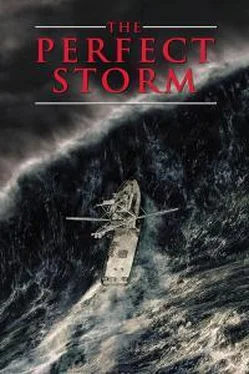Sebastian Junger - The Perfect Storm
Здесь есть возможность читать онлайн «Sebastian Junger - The Perfect Storm» — ознакомительный отрывок электронной книги совершенно бесплатно, а после прочтения отрывка купить полную версию. В некоторых случаях можно слушать аудио, скачать через торрент в формате fb2 и присутствует краткое содержание. Жанр: Триллер, Проза. Описание произведения, (предисловие) а так же отзывы посетителей доступны на портале библиотеки ЛибКат.
- Название:The Perfect Storm
- Автор:
- Жанр:
- Год:неизвестен
- ISBN:нет данных
- Рейтинг книги:3 / 5. Голосов: 1
-
Избранное:Добавить в избранное
- Отзывы:
-
Ваша оценка:
- 60
- 1
- 2
- 3
- 4
- 5
The Perfect Storm: краткое содержание, описание и аннотация
Предлагаем к чтению аннотацию, описание, краткое содержание или предисловие (зависит от того, что написал сам автор книги «The Perfect Storm»). Если вы не нашли необходимую информацию о книге — напишите в комментариях, мы постараемся отыскать её.
The Perfect Storm — читать онлайн ознакомительный отрывок
Ниже представлен текст книги, разбитый по страницам. Система сохранения места последней прочитанной страницы, позволяет с удобством читать онлайн бесплатно книгу «The Perfect Storm», без необходимости каждый раз заново искать на чём Вы остановились. Поставьте закладку, и сможете в любой момент перейти на страницу, на которой закончили чтение.
Интервал:
Закладка:
Haulback began at 5:10 A.M. with the pulling on board of the highflyer and radio beacon. Yankee hooks and traps were coiled and boxed as they came on board and monofilament hooks were wound on reels. The captain steering and throttling the boat fishes the longline for "weight." The first fish was a swordfish. With its bill breaking the water surface and then rolling on its back, dead, it was hauled to the vessel on the longline. Gaffed, it is pulled aboard, its sword sawed off and the fish is cleaned. The crew checks the stomach contents and feels the internal body temperature for clues as to what type of water the fish has been in. Most of the swordfish were feeding on squid.
The next two days of fishing took place in the same general area south of the Tail of the Banks. On the second day we caught eleven swordfish, four blue sharks, one mako shark, one sea turtle (released alive) and one skate. We kept the mako in addition to the swordfish. The third day during set-out we had a gear conflict. Despite efforts by captains to establish berths and to contact all area boats on gear positions, we crossed a longline. Our vessel's stabilizers, which hang from outriggers about 18 feet below the surface, caught on a longline. The port stabilizer held fast but the starboard stabilizer, which is composed of lead and steel, left rhe water and slammed into the bait box just inches from a seaman.
To escape gear conflicts and the increased traffic, we moved northeast over the Newfoundland seamounts. The next fishing day, August 30—31, was fairly routine. The captain set out a lesser number of hooks (300) because the water wasn't quite right (flat water). Despite this we caught nine swordfish. During haulback we lost the gear for an hour due to the mainline parting. After haulback the captain, in order to find better waters, steamed all night and into the northeast approximately 170 miles towards the Flemish Cap. Whales were seen in the distance. On September 4 we set out 400 hooks and the catch consisted of twelve swordfish, one mako shark, three lancetfish, three skates, one blue shark and a leatherback turtle, which was released alive.
On the night of September 5, the captain rendezvoused with the swordfish vessel Andrea Gail so I could get home. The vessels tied stern-to-stern and transferred my gear on a second line. Then the vessels untied and the Andrea Gail aligned her starboard side to the stern of the Tiffany Vance, and I swam the 30 yards to the Andrea Gail. They pulled me on board, and two days later we landed at the port of Burin, Newfoundland. The owner of the Andrea Gail, Robert Brown, who flew to Newfoundland to replace malfunctioning generators, flew us home to Beverly Airport on September 9, 1982. The Tiffany Vance arrived in New Bedford on October 18—sixty-three days at sea with 25,000 pounds of swordfish.
Swordfish fishermen, in particular the Grand Banks fishermen, are at sea for extended periods of time without communication with the mainland. An opportunity to study shortterm culture shock is available among these fishermen, and should be undertaken.
Through the end of September and the first week in October the crew of the Andrea Gail set out their gear, steam back, haul it up, and set it out again. The days are hot and the men are in tshirts on deck, their skin curing to a salt-streaked brown in the afternoon sun. In the evening they put on jackets and sweatshirts and work the bait table with their hoods pulled up. The light angles and reddens and finally sinks into darkness with the decklights ruining the stars and the sharp cold air digging at memories of the New England fall. Around ten o'clock the men finish up and pitch into their bunks for a few hours' sleep.
To a fisherman, the Grand Banks are as distinct and recognizable as, say, the Arizona deserts or the swamps of Georgia. They have their own particular water, light, wildlife, "feel." No bluewater fisherman could ever wake up on the Grand Banks and think he was
off Georges, say, or Long Island. Cliffs of fog move in and smother the boats for weeks at a time. Winter cold fronts come howling down off the Canadian Shield and make the water smoke. The sea is so rich with plankton that it turns a dull green-grey and swallows light rather than reflects it. Petrels and shearwaters circle the boats hundreds of miles from land. Great skuas swoop over the waters, rasping hah-hah-hah at their empty world. Prehistoric-looking creatures called beaked whales spook the crews of fogbound boats. Killer whales range up and down the longlines eating—strangely enough—only the pectoral fins of blue sharks.
Billy's fishing about 200 miles east of the Tail, near a set of shallows known as the Newfoundland Seamounts. On the horizon he can occasionally make out the white pilothouse of a boat called the Mary T, captained by a Florida man named Albert Johnston. Johnston and Billy fish end for end for about a week, setting their gear southwestward in two great parallel lines. The lines stitch back and forth across slight temperature breaks to anchor the gear in the slower-moving cold water. From time to time they see each other during the haulback, but mostly they're just snowy images on each other's radar screens. Sword boats on the high seas don't socialize much. One would think they would—my God, all that emptiness—but generally they'd rather socialize in a barroom or in bed with their wives. (A waterfront joke: What's the second thing a fisherman does when he gets home? Puts down his bags.) Captains have been known to pull one steel bird out of the water on the trip home just because it slows them down by half a knot. Over the course of a week that means twelve more hours until they get home. Four or five days into October, Johnston hauls his last set and tells the rest of the fleet he's heading in. He says he'll radio the weather conditions back as he goes. The boat rolls along atop an old decayed swell, and the crew catch up on their sleep and take turns at the helm. A new moon rises behind them on October 7th, and they follow its pale suggestion all through the day until late that afternoon. The sunset is a bloody rust-red on a sharp autumn horizon, and the night comes in fast with a northwest wind and a sky rivetted with stars. There's no sound but the smack of water on steel and the heavy gargle of the diesel engine. The Mary T makes port in Fairhaven, Massachusetts, on October nth, after more than a month at sea.
Fairhaven is a smaller version of New Bedford, which sits half a mile away across the Acushnet River. Both cities are tough, bankrupt little places that never managed to diversify during the century-long decline of the New England fishing industry. If Gloucester is the delinquent kid who's had a few scrapes with the law, New Bedford is the truly mean older brother who's going to kill someone one day. One New Bedford bar was the scene of an infamous gang rape; another was known to employ a Doberman pinscher as a bouncer, A lot of heroin passes through New Bedford, and a lot of swordfishermen get in trouble there. One of Johnston's crew drew a $13,000 check in New Bedford and returned a week later without any shoes.
Johnston ties up at Union Wharf alongside McLean's Seafood and North Atlantic Diesel. McLean's is a battered two-story building with cement floors for draining fishblood and a rabbit warren of offices upstairs where deals are cut. Dark, wild-haired young men stomp around in rubber boots and shout to each other in Portuguese as they heave fish around the room. With long knives they "loin" the fish— carve the meat off the bones—and then seal it in vacuum bags and load it onto trucks. A good worker can loin a full-sized fish in two minutes. McLean's moves two million pounds of swordfish a year, and a million pounds of tuna. They fly it overseas, ship it around the country, and sell it to the corner store.
Читать дальшеИнтервал:
Закладка:
Похожие книги на «The Perfect Storm»
Представляем Вашему вниманию похожие книги на «The Perfect Storm» списком для выбора. Мы отобрали схожую по названию и смыслу литературу в надежде предоставить читателям больше вариантов отыскать новые, интересные, ещё непрочитанные произведения.
Обсуждение, отзывы о книге «The Perfect Storm» и просто собственные мнения читателей. Оставьте ваши комментарии, напишите, что Вы думаете о произведении, его смысле или главных героях. Укажите что конкретно понравилось, а что нет, и почему Вы так считаете.












